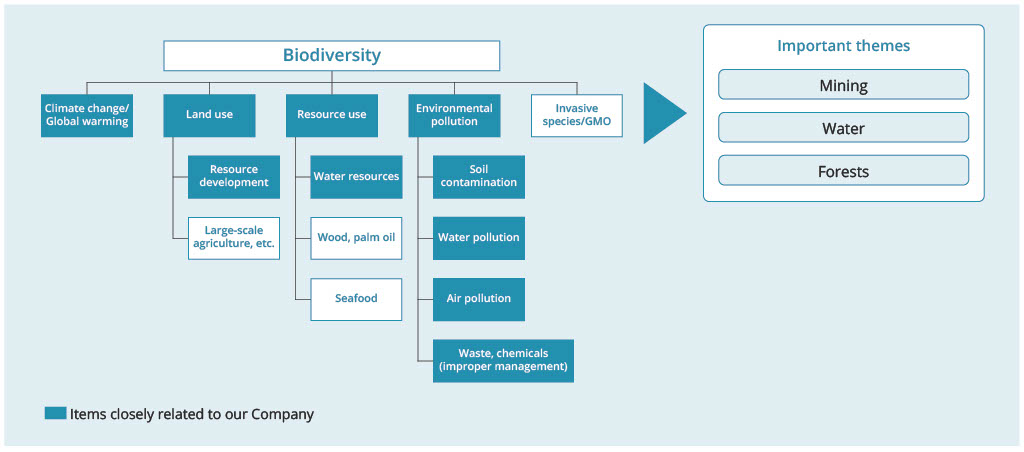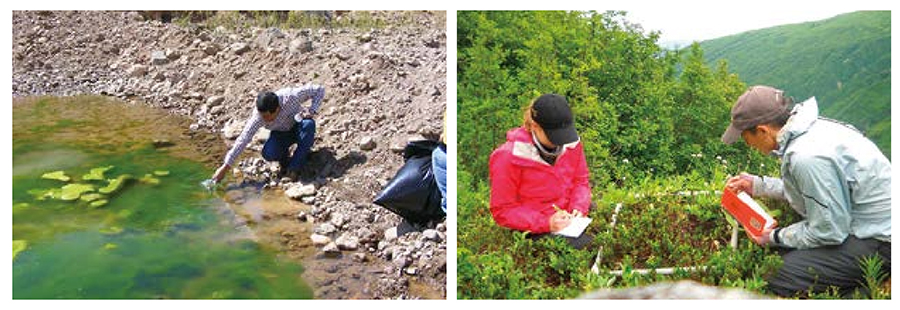The DOWA Group’s business activities are dependent on the benefits of biodiversity and natural capital, and at the same time, may have various impacts on them. In accordance with our Basic Policy on Biodiversity, we give due consideration to natural capital, including biodiversity, and strive to maintain, preserve, and restore it. We are also working to sort out opportunities and risks from our business with regard to the use of ecosystems and natural capital. We seek to minimize the impact on biodiversity and actively conserve it through afforestation and other means that are in harmony with the natural environment of the region.
In preparation for disclosure based on the TNFD framework, we have adopted the LEAP approach advocated by the TNFD and have begun assessing the environmental risks and nature-related impacts of our business. DOWA’s manufacturing operations are centered on non-ferrous metals and, with the exception of water, do not use biological resources as major raw materials. However, our environmental management and land use may have an impact on biodiversity. To this end, we have considered various factors (interfaces) that affect natural capital and identified items that are particularly relevant to our Company.
In fiscal 2024, we plan to conduct biodiversity risk surveys and water stress surveys at all of our production bases in Japan and overseas based on these important themes ; "Mining", "Water" and "Forests", identify high-priority regions, and assess the impacts, risks, and opportunities.
"Mining” and "Water" are mainly posted on the Conservation of environment page.

We promote mineral exploration and development projects for zinc mines to ensure a long-term zinc supply. Since mine development and operations have a large impact on the natural environment and local communities, we give careful consideration to the ecosystem and the water environment. Even at overseas mines currently under development, we are taking appropriate measures that begin from the mineral exploration stage onward in order to minimize the impact on the environment, such as regular environmental monitoring and environmental assessments that include ecosystem surveys and water quality assessments.

- 拡大
- Water quality and ecosystem monitoring (overseas mining exploration project)
The DOWA Group conducts environmental impact assessments when constructing new manufacturing sites or starting new operations, checks the status of biodiversity in the surrounding area and on the site, and gives necessary consideration and conservation.
Since the DOWA Group’s manufacturing businesses are centered on nonferrous metals, excluding water it does not use biological resources as its main raw materials. However, as we do use paper at all of our domestic and overseas business locations, the entire Group purchases large amounts of paper each year. For this reason, we use paper made from a mixture of old paper and forest-certified wood pulp for photocopy paper and pamphlets while making every effort to use sustainable biological resources. When selecting paper suppliers, the Group not only confirms that the paper itself is environment-friendly but also verifies that said suppliers carry out sustainable paper procurement based on its CSR Procurement Policy.
- Establishment of a procurement policy for wood feedstock
- Establishment and operation of a management system that confirms the legality of the wood feedstock
- Can provide information about the supplier of raw material pulp
For the DOWA Group, which once experienced deforestation due to mining activities, activities such as greening and reviving indigenous vegetation are a mission and a major challenge that we will continue to tackle. It is difficult to grow plants on former mine sites, so in 2006 we began planting trees on the smelter grounds in Kosaka, Akita Prefecture, under the guidance of the Institute for Global Environmental Strategies Japanese Center for International Studies in Ecology, a public foundation that conducts research on plant ecology. We aim to create a natural and stable forest so that, different from an artificial forest, it does not require maintenance by humans. With the cooperation of local forestry associations and seedling companies, the project involves “making a local forest with local trees” to restore the region’s native vegetation.
In 2007, the Kosaka Local Forest Planting Festival was launched, in which greening and tree planting activities were carried out with local residents, and the event has now become a place for local communication. In fiscal 2023, we held a tree-planting festival in June, with approximately 180 participants, including children from local elementary schools and local residents, as well as our Group employees. We planted 1,000 seedlings of 16 local broadleaf species, including Mizunara oak, beech, zelkova, and Japanese maple. The total number of trees planted by 2023 is now approximately 200,000.
The total number of trees planted by 2023 : Approximately 200,000
Tree species : 16 local broadleaf species, including Mizunara oak, beech, zelkova, and Japanese maple


